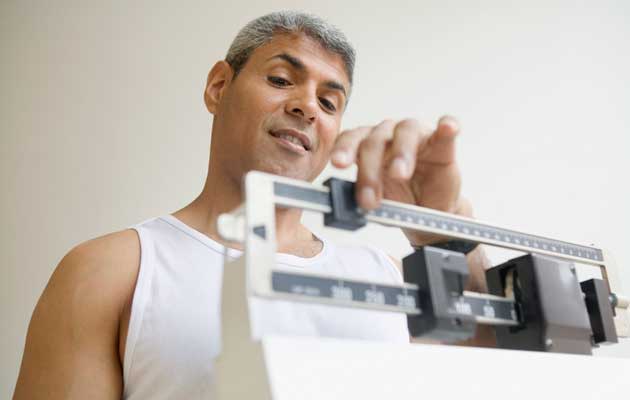How you might be sabotaging your fitness program (part 2)

In last week's article we talked about sleep, the right forms of exercise, and focusing on fat loss not the scale weight. This week I will cite three more common ways that you might be sabotaging your progress and health.
1. Trying to lose weight too fast. While I am a big fan of fast results, I also want results that last long term. When it comes to losing weight, the key message that my team and I tell the personal training and Singapore bootcamp clients who join the Genesis Gym, is: Slow and steady wins.
The reason for this is that the faster you lose weight, the more likely you will drop your precious lean muscle which slows metabolism and makes you put back the weight again in the long run.
A good target for slow, steady and maintainable progress is about 0.5kg per week (or about 0.7 per cent of your body weight) Actually you will be losing more than this in terms of fat. But on a proper training and nutrition program, you should also be gaining lean, attractive, firm muscle tissue.
So you may lose 1kg of fat, gain 0.5kg of muscle and lose only 0.5kg on the scale. As mentioned in last week's article, its the fat loss that matters, not the weight.
So, if you are 25kg overweight, it will take a year to drop that safely. After all, unless you have a serious health condition, you don't get fat overnight. So don't expect to see your six-pack overnight either!
If you progress at this "slow" pace, you will get a very amazing transformation, that lasts. Not one that "yo-yos".
So, keep it slow and steady, build the right habits, and you can get great results.
2. You fear fat. Many people try to avoid fat like it is a contagious disease. They take off the fat on meat. They eat "low fat" versions of everything from milk to cereal, and they treat butter like it is an instant heart attack.
I certainly don't recommend bad fats, like those used in deep frying, or those which undergo artificial processing. These fats are called trans-fats or hydrogenated vegetable oils.
The process used to make these fats was originally designed to make candles from plant oils. So the next time you think about eating a potato chip, think about the fact that you are actually eating the chemical equivalent of a waxy candle...
These fats are totally foreign to your body, and may end up causing lots of damage.
However, natural fats, even saturated fats, are critical. Eating them will boost your health and actually make you stronger. Here are just some of their functions...
Absorption of nutrients -- many nutrients are fat soluble
Formation of nerve lining and brain cells -- makes you stronger and smarter
Formation of muscle building and fat burning hormones -- helps you achieve your fitness goals
Blood sugar management -- healthy fats encourage more nutrients to go into your healthy muscle cells and less to go into your fat cells.
Now, where do you get these healthy fats? From natural sources like grass fed meat, nuts, cold water fish, supplements like omega 3 oils, and good oils like olive oil, butter and coconut oil.
Coconut oil and butter are also excellent for cooking because they have a high smoke point and don't turn cancer causing black easily.
Add in some of these oils to each of your meals. A teaspoon of fish oil, butter, or coconut oil with each meal would be a great start. Nothing bad will happen as long as you keep the refined carbohydrates low.
3. You don't take care of injuries ASAP. There is a risk of injury in all exercise and sports. But there are ways to reduce their risk. All good coaches will do an assessment of you and your current muscle flexibility and function before starting you on a training program, or sport.
If a person can hardly climb up stairs without pain, they certainly have no business running or jumping!
Some tough guys (it's usually guys, and I have made this mistake before) think they can play or train through injury, but that would be a mistake.
Any time you have a weakness, or injury, your body compensates for it and causes more problems. For example, if your knees have an issue, and you keep running on them, rest assured your hips, back and ankles are on the road to injury as well.
I call this the "criminal" and the "victim" situation. Your back may be the "victim" which keeps getting hurt. You go for lots of massage and stretching but it never gets better... it may be because the "criminal" is a hip or knee problem which does not get fixed and keeps attacking the victim!
A good soft tissue practitioner should be able to help you determine the cause of your problem and fix it fast. A good indicator that a therapist knows what he or she is doing is that one to two sessions give you significant results. If this is not the case, change therapist. Get fixed. Don't buy "packages of 20 treatments".
So, once you get a nagging ache. Please get it checked out before the problems become worse. At least don't keep training parts that cause problems. A good indicator that a pain is "bad" for you is that it is either sharp pain (stop immediately) or dull, nagging pain that does not go away (get it checked out!).
There we have it, three more tips to keep you on the right track to your health and fitness goals.
For the best personal training and top indoor fitness boot camp program in Singapore visit www.coachjon.com


